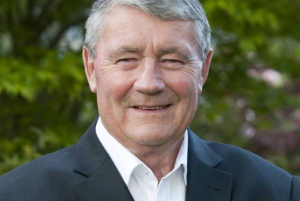Farmers will remember Jim Anderton as a pragmatist who got things done, Federated Farmers President Katie Milne says.
"While many Kiwis cherish him as a straight-shooter who spoke up for the disadvantaged and less well off, his significant contribution to the primary sector also should not be forgotten."
Anderton, a former deputy Prime Minister in the Helen Clark Government, passed away this week. He was 79.
According to Milne, there were some raised eyebrows when Helen Clark appointed Anderton as Agricultural and Biosecurity Minister in 2005. Three weeks into the role, he told a meeting of the Federated
Farmers National Council that while he didn’t know much about farming compared to his audience, as Economic Development Minister for the previous six years he brought expertise in bringing industries together to improve their economic performance and "I'm the minister for 'getting things done'."
"So it proved," Milne said. "He turned out to be one of our best agriculture Ministers. He was a strong advocate for the sector, and regularly reminded New Zealanders that farming was the most important source of export income for New Zealand.
"I was greatly impressed and inspired as a young leader when I had the privilege of accompanying him when he visited the West Coast in his early days as the new Minister. My lasting memory of Jim
Anderton is of an approachable and accessible man who listened and got things done."
Anderton championed the importance of irrigation to the economy, supporting an in-depth study that quantified the economic and environmental value of the Opuha Dam to South Canterbury and boosting funding assistance for irrigation through the Community Irrigation Fund.
His advocacy spurred a significant boost to the sustainable development of the primary sector, including $700 million for the R&D Fast Forward Fund, rebranded as Primary Growth Partnership; financial support to establish a nationwide network of Rural Support Trust to assist rural communities following adverse events; and funding a range of initiatives seeking to reduce the primary sector’s carbon footprint, recognising that bringing livestock emissions into the ETS was problematic.
Anderton was not afraid of a challenge and would do what was right rather than what was popular, Katie said. He was one of Ministers who initiated New Zealand taking Australia to the World Trade Organisation over their blockage of NZ’s apple access to Australia.
Despite a degree of opposition, he was a strong supporter of the highly successful Recognised Seasonal Employer (RSE) scheme that came into effect in 2007. It has been vital to the horticulture and viticulture industries to recruit workers from overseas for seasonal work when there are not enough New Zealand workers.
"Federated Farmers pays tribute to Anderton, who earned the wide respect of those in the primary sector during the three years he was Minister of Agriculture,” said Milne.



















